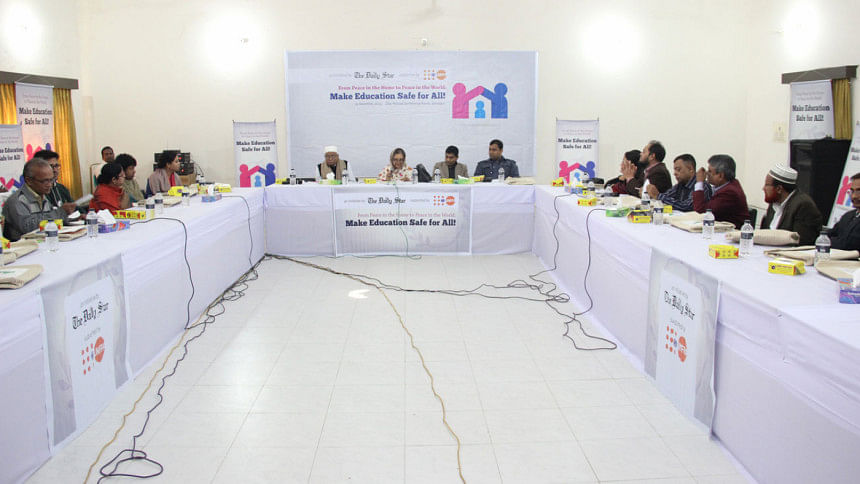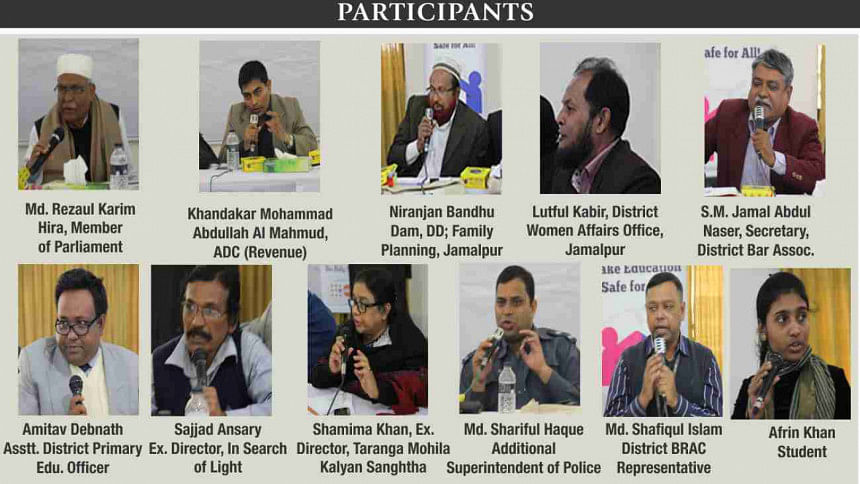16 Days of Activism against Gender Based Violence

On the 19th of December, The Daily Star and the United Nations Population Fund (UNFPA) jointly organized a roundtable at the Zila Parishad Conference Room, Jamalpur. The Chief Guest was Md. Rezaul Karim Hira, Member of Parliament and the roundtable was moderated by Dr. Nilufar Kamorez Jaha who gave a brief on the main topic - gender based violence. The title of the discussion was “End Violence against Women and Girl Child: 16 Days of Activism against Gender Based Violence”. Participants at the roundtable included representatives from NGOS, law enforcement agencies and policy makers.
Keynote presentation was given by Md. Shariful Haque, Superintendent Police, presented the keynote paper discussing issues such as the prevalence of gender-based violence and typologies of violence, ranging from emotional to physical and sexual violence. He highlighted the vicious cycle of violence that a girl experiences starting from the womb (female infanticide, lack of nutrition and health care) to various stages of adolescence (child abuse, malnutrition, rape, forced prostitution), to adulthood (dowry killings, intimate partner violence, domestic violence) till old age (widow abuse).
Status quo of gender based violence indicated that 56% of women entered their first marriage before they were 18 years old and 87% of women had experienced some form of violence at the hands of their current husbands. Incidences of physical and sexual violence experienced by married women where the perpetrators were their husbands stands at 65% and 36.5%, respectively and only 77% of women had reported violence at the hands of their husbands in the last 12 months. Compared to urban areas, the prevalence rate of such incidences is higher in rural areas.
In rural areas 43% of unmarried adolescent girls are sexually harassed on their way to school, college or social visits (Alam, Roy, and Ahmed 2009). As this brings forth the question of the safety and security of girls, many including their own parents consider discontinuing with their education.
Effect of such violence also leaves a mark on children of women who experience abuse. They may exhibit behavioral problems, poor school performance and increased likelihood of experiencing and perpetrating violence as adults. In general, families are likelier to have impaired family functions and suffer economically. Therefore, on a macro level, violence against women costs 2% of the GDP in Bangladesh (study on Cost of Violence by CARE Bangladesh, 2012).
Unequal gender norms, stereotyped perception, poor investment in youth and adolescents, lack of social safety and the culture of silence and impunity all contribute to the increase of incidences of gender based violence. The only way to break through these barriers that hold back girls and women is by introducing Comprehensive multi-sectoral programmes that fulfill girls rights to health, social, and economic resources. Girl-centered programs need to be introduced that ensure safe neighborhoods and safe school environment (in school and way to/from school).Schools need to retain girls from dropping out or delay the process until they have finished at least the 12th grade. This contributes to the delaying of marriage, in other words child marriage. Increase in accessibility to information regarding gender based violence and sexual reproductive health services are needed to prevent and reduce incidences of early childbearing and violence. The youth should be provided with life-skill based and employable livelihood training that includes financial literacy for out of school children.
Md. Rezaul Karim Hira, Member of Parliament from Jamalpur talked about the plans and programmes undertaken by the present government to educate the young generation empower them and arrange for their skill training so that they may become competent enough to contribute to country's progress by 2030. This is the main objective of SDG, he explained. He mentioned the various schemes taken up for the overall development of the young girls of the country so that they may share equally the responsibility of nation building. In response to a question put forward by a girl student he said that women are given nomination by his party so they may contest elections and come to parliament. In politics there is equal opportunity for all. He said that his government has already taken various measures to address gender based violence, child marriage, sexual harassment, women education and empowerment.
Khandakar Mohammad Abdullah Al Mahmud, Additional District Commissioner (Revenue) raised the issue of girls being deprived of their father's property and thereby remaining dependent on others. He said when a person dies the local chairman gives a death certificate mentioning that the deceased has left behind three sons. No names of daughters are mentioned there. This ultimately makes inheritance of father's property difficult for the daughters and this is how girls are deprived of land ownership. A landless woman is economically weak so she remains dependent and thereby vulnerable to violence and discrimination. ADC Revenue said with conviction that there are positive developments with women in the country. There is more enrollment and less drop-out by girls as they get stipends for education. He said that a time will come when there will be more girls enrolled for higher education than boys. But he observed that girls from poor background do not get the opportunity to complete school education and higher education is a dream for them. He suggested government agencies and NGOs should work among such groups so that parents may realise the benefits of educating their daughters.
During the open discussion session, students from various educational institutes expressed their concerns regarding violence, sexual harassment and child marriage. Afrin, a student shared how 26 girls have formed a group in their area to work against child marriage and other problems affecting them. As a result their village is now child-marriage free, she informed. She mentions a case when a male teacher had touched the body of a girl student on the pretext of giving her punishment. They went and complained to the head teacher.
Local BRAC representative Shafiqul Islam told the participants that, in Jamalpur BRAC address the adolescent health and reproductive health issues through 156 adolescent clubs. About 40 young boys and girls meet every week and discuss issues like puberty, menstruation, child marriage, dowry etc. He believes education is the tool to change mindset.

WHAT NEEDS TO BE DONE:
* During school and college hours, police patrolling should be ensured
* Inclusion of chapter on morality and values and puberty to be included
* Wide spread awareness campaign regarding contribution of women in family, society and state
* Change of age-old attitude towards women in society
* Increasing participation of women in politics and administration
* Making education up to HSC free for girls
* Recognition of the economic value of women's household work
* Recognising that women are also human beings and ensuring their right to a life of dignity
* Hygienic sanitation facilities for male and female in all institutes
* Making anti-GBV committees active
* Removing wage discrimination between men and women at grassroots level.
* Identifying the role of schools in preventing child marriage
* False birth registration certificates are obstacles in preventing child marriage
* Messages regarding GBV, child marriage etc., can be imparted through cartoons and dramas.
* Some of the educational institutes are located in remote areas. Occasionally unwanted persons enter and try to harass girls. Administration should take action against such persons.
* Eve teasers should be boycotted socially.
* Co-education will help change attitude of boys towards girls.
* Co-education should start from primary level
* Teachers should not avoid taking questions on puberty
* There should be counselor in each school
* There should be a doctor in each school

 For all latest news, follow The Daily Star's Google News channel.
For all latest news, follow The Daily Star's Google News channel. 



Comments